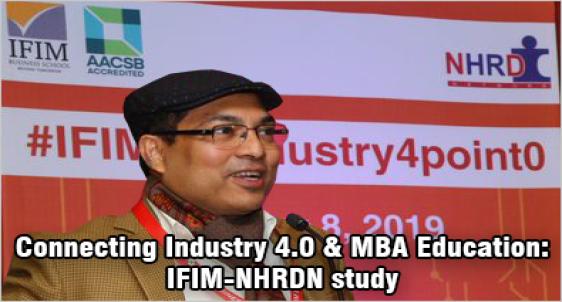
Powered by rapid technological advancements, the Industry 4.0 or Fourth Industrial Revolution Trends are transforming every business function - be it manufacturing, services, sales & marketing or HR. As Indian industry adapts ferociously to these trends, B-schools must rethink their curriculum or face the ignominy. A study by AACSB accredited IFIM Business School, Bangalore & National HRD Network (NHRDN) has researched 300 business executives and prepared a blueprint of what the MBA Curriculum should be for the Industry 4.0. The study identified 10 expectations from Indian MBAs and suggestions on how to serve these needs.
The report titled ‘Curricula 4.0 - Creating Future Managers’ was released in Bengaluru on January 8, 2019, by Dr Tom R. Robinson, President and CEO, AACSB; Management Guru Dr Jagdish Sheth, Dr A. Parasuraman, Professor of Marketing at University of Miami, USA, Mr Dhananjay Singh, Director General – NHRDN and Dr Atish Chattopadhay, Director, IFIM Business School.
What MBA Skills does Indian Industry really want for Industry 4.0 Era
While there has been a lot of international literature and reports on Industry 4.0 trends and MBA education, little is known about how these trends are changing the expectations that Indian industry has from MBAs.
IFIM-NHRD study reveals 10 Industry 4.0 needs
- Learning orientation and analytical mindset
- Integration of data, communication and technology
- Solution orientation and problem solving
- Dealing with change and uncertainty
- People and team orientation
- Innovation and creativity
- Social sensitivity and cross-cultural orientation
- Managing self (self-awareness and self-development including wellness)
- Entrepreneurial and business orientation
- Globalization
Commenting on the relevance of the study, Dr Atish Chattopadhyay, Director, IFIM Business School said, “This is the first time that a Business School, in India, has taken such an exhaustive initiative to reach out to 300 industry executives to find out the skills required for Industry 4.0. The ten needs identified for industry 4.0 along with the insights, will go a long way in aligning the future of business education with the future of work.”
Complimenting IFIM for the initiative, Tom Robinson, AACSB International's President and CEO, added, "I am pleased to see AACSB-accredited IFIM Business School deeply engaging business in this initiative to shape future management curricula.”
Mapping IFIM-NHRD study with WEF report and Dr Datar’s book
How do these requirements map with international studies? IFIM Study also maps these gaps with respected studies by Harvard Business School’s Prof Srikant Datar’s book ‘Rethinking the MBA’ and World Economic Forum’s ‘Future of Jobs Report’.
|
Industry 4.0 needs from IFIM study
|
Unmet needs from ‘Rethinking the MBA’
|
WEF skill dimensions
|
|
|
|
|
|
|
|
|
|
|
|
|
|
|
|
|
|
|
|
|
|
|
|
|
|
|
|
|
|
Talking about what the comparison with the two international studies reveals, Dr Chattopadhyay says, “Learning Orientation has emerged as a distinct need owing to multi-generation workforce within an organization, requiring reskilling at various levels. Similarly, Communication is not just a combination of oral and written communication but needs to be integrated with data and technology. The study brings in a completely new dimension Wellness as an element of self-management, hitherto not talked about or revealed by any of the past studies. The other important insight revealed by the study is that Solution, as reflected in service mindset and execution, assumes more significance than strategy. The study clearly indicates that there is a need for reorientation of the curriculum, pedagogy of teaching-learning and introduction of a new category of faculty, for example, yoga or gym instructors as part of the mainstream.”
Key Findings and Possible Curriculum Interventions
So, what are the lessons from this study for Indian B-schools? How can they reshape their curriculum to prepare their student’s better for Industry 4.0 era? The study gives the following recommendations, that are aligned with each industry need:
|
Industry 4.0 needs from IFIM study
|
Potential Curriculum Interventions
|
|
|
|
|
|
|
|
|
|
|
|
|
|
|
|
|
|
|
|
|
Research Methodology of IFIM-NHRDN Study
The study was conducted over six months in 2018, involving about around 300 senior managers across 13 industries such as IT, Consulting, Education and Manufacturing, who shared their opinions on what according to them should be the right skill set for future leaders. This was followed by a series of roundtable discussions, across the country, comprising heterogeneity of CXOs and the academia to further understand the unmet needs - present and future. The findings will be implemented into a ‘next-gen’ MBA curriculum.
The study was jointly conducted by National HRD Network and IFIM Business School, Bangalore. National HRD Network is an association of HR and business professionals with 30 chapters, which together have over 8,000 members in India.
Established in 1995, IFIM Business School, Bangalore became only the sixth management institute in India to receive the prestigious accreditation from the AACSB International and is currently among the eight AACSB accredited B-schools in India.
Based on the study findings, IFIM is busy updating its own curriculum for upcoming Batch of 2019-21. IFIM offers four 2-year MBA equivalent programs -- PGDM, PGDM (Finance), PGDM Marketing & PGDM (International Business). Recently IFIM announced 100% Placements for its 2018-20 batch with record salaries. IFIM Admission process is currently open. Read more details. IFIM is also offering merit-based scholarships to deserving candidates.
Stay tuned to MBAUniverse.com for more updates on IFIM Bangalore




















